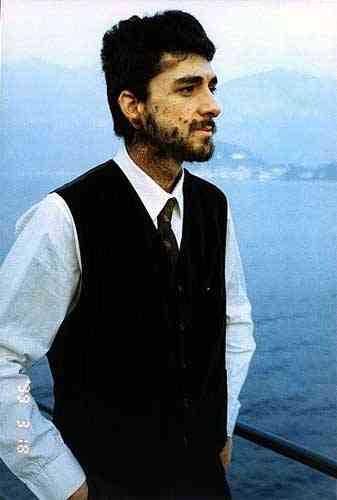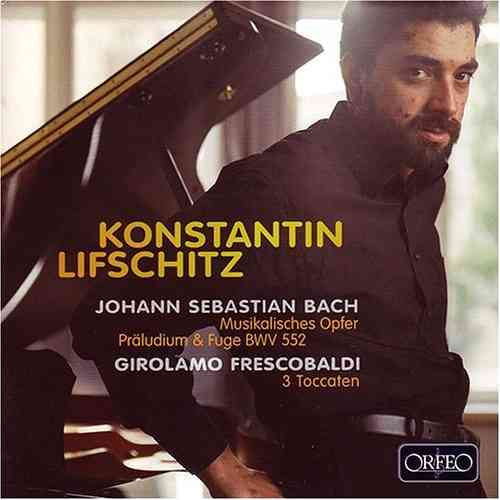
I was born in December 1976 in Kharkov, which back then was a city where everyone spoke Russian, but today my birthplace does not appear on the map of Russia. The coincidence of my birth in this ‘myth’ town has left me with a debt of explanation to non-Russians that I am not Ukrainian. It is mythological to me because anyone connecting me to this place has left it, including my parents, family and all of their acquaintances, dispersing to different corners of both this world and the next one. Now Kharkov appears in my consciousness somewhere between Chagall’s Vitebsk and the Tamara Gardens in the Nabokov novel... Music as a performing creative art on the piano did not begin for me with Mozart, Beethoven or Chopin, but with Rameau, whose ‘Tambourin’ I played for my very first concert as a four year-old. And it also began with J. S. Bach. [Eventually], I realized that my diction was a poetic one, but its intonation was not so much lyrical as it was ‘Virgil-like’, ‘remote’. In spite of (or because of—) the fact that fate has granted me encounters with a lot of eminent Musicians, I have always been on a search for my own plasticity as well as my own tools of expression.”
— Konstantin Lifschitz.
T hese works need special consideration from a player who has been trained in a different norm of notation and performance. But there is as much latitude for interpretive variation in earlier music as in music of the 19th and 20th Centuries—in fact, there is often more.”Konstantin Lifschitz will perform on Friday evening in the Master Pianists Series at Friends of Chamber Music in Kansas City. In a program that also includes Beethoven Sonatas there will also be a generous helping of baroque:
— Richard Troeger, Playing Bach at the Keyboard, p. 259.
- Frescobaldi: Three Toccatas
- Bach: Two Ricercars from The Musical Offering, BWV 1079 (Ricercar a 6; Ricercar a 3).
Originally, ricercars were ‘open-ended’. Baroque composers emulated Renaissance style for ‘stile antico’ effects. The ricercar began as an early proto-fugue with a slow opening. But it didn’t stay that way. Further permuting and stretching the ricercar idiom, in ‘A Musical Offering’ Bach gave the name ‘ricercar’ to pieces that have ‘galant’ or even later features.
In Lifschitz’s Bach and Frescobaldi we get a sense of the difference between ‘strict and learnèd fugues’ vs. ‘progressive and casual fugues’. He achieves a unique sort of ‘productive objectivity’—that strikes us like ‘facial contextualist’ readings of the constitution of some country that we are surprised to discover we have never visited. Maybe the place is ‘mythical’, its existence vehemently denied by the authorized political maps. I have no way of knowing, but I suspect it has to do with Lifschitz’s native, now-mythical Kharkov.

Once upon a time (more than 50 years ago), the relationship between being, thought, and language (such as the musical manuscript written by a composer) was completely ‘grounded’. So grounded that people took it for granted—like it was ‘built-in’, a ‘given’. The total and obligate ‘contingency’ of all human discourse—including discourse in music—wasn’t appreciated. Even piano technique was less diverse then than it is now.
Then came post-modernism and deconstruction and other influences, and discourses were suddenly thought of as existential acting-out by the subjects, who disclose their personal engagements with the world and reveal how they are ‘inscribed’ by the world right back. Questions about what is ‘real’ center today more around inner conditions of human consciousness, and less around external reality. Transcendental subjectivity...
Liftschitz swoops in like a great Russian owl, an irruption of natural Kharkovian alterity... beautiful polysemy... Kharkovian heterodoxy right here in this American concert hall...
In piano, like in any language, there is an ethics of communication—one must try always to say what one really means to the other, to understand what the other really means (meant) to say, and to communicate in good faith—with some genuine preparedness to be persuaded by the other. This patience and good will... this receptiveness to endless undecidability... this eschewing of any rule-governed, static response is partly what is so admirable in Lifschitz.
M ore than any other composer, except some contemporary ones, Bach leads me on these highly exhausting but simultaneously rejoicing quests. Even though I don’t feel particularly content with my Bach playing, for some reason my Bach recordings of the 1990s received some lofty international critical reviews... I am trying to transmit to the listeners a ‘pantheistic’ perception of Earth’s nature with all its hills, brooks, vineyards, fields and seas... I would like to mirror such phenomena as medieval architectonics; frenzy; the immobility of Japanese theatre; and also lyrical urbanity.”It amounts to a transcendental ‘undeconstructible condition of deconstruction’, an ‘ultra-ethics’ or ‘meta-ethical ethics of ethics’. The fact that works that we love and think we understood can stand up to being taken apart by this poetic philosopher of the keyboard is... reassuring... breath-taking... unique!
— Konstantin Lifschitz.

Lifschitz is a responsible imaginer... approachable, not at all elusive. Each work arises within a time and place—it always has a context—Italy in 1640; Germany in 1740; Kharkov in Konstantin’s youth; the world-at-large right now.
One could argue that it is a mistake to read Bach or Frescobaldi in anything other than formal, aesthetic terms. But to do that is to discard the hermeneutics of the work. To reduce them to notes and ritualized performance practice is to refuse to understand them; to hear but refuse to listen. Just as reducing paintings to paint is to ‘see’ but refuse to ‘see as’.
The post-modern Louis le Brocquy studies of the head of Samuel Beckett call into question who is gazing and who is gazed-upon. So, too, the baroque performance style of Konstantin Lifschitz calls seriously into question ‘who’ is playing/saying and ‘who’ is listening. It is truly beautiful in any case—and it is ‘mind-blowing’ as well, if you decide to allow it to be that.

- Konstantin Lifschitz website
- Konstantin Lifschitz at Friends of Chamber Music
- Lifschitz K. Bach: Musikalisches Opfer; Präludium & Fuge, BWV 552; Frescobaldi: 3 Toccaten. (Orfeo, 2007.)
- Strolling through Kharkov
- Badura-Skoda P. Interpreting Bach at the Keyboard. Oxford Univ, 1995.
- Biddle I, Knight V. Music, National Identity and the Politics of Location. Ashgate, 2007.
- Donington R. Baroque Music, Style and Performance. Norton, 1982.
- Ede L. Situating Composition: Composition Studies and the Politics of Location. Southern Illinois Univ, 2004.
- Fehér M, Kiss O, Ropolyi L, eds. Hermeneutics and Science. Springer, 1999.
- Kearney R. Poetics of Modernity: Toward a Hermeneutic Imagination. Humanity, 1995.
- Troeger R. Playing Bach on the Keyboard. Amadeus, 2003.
- Louis le Brocquy page at Wikipedia
- le Brocquy website

No comments:
Post a Comment